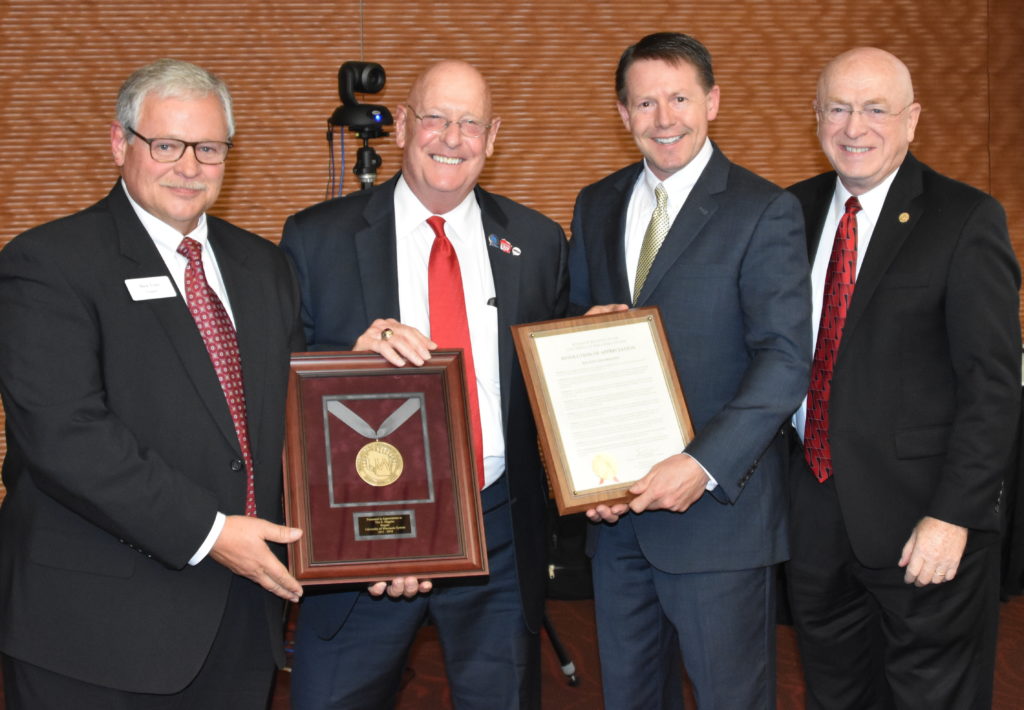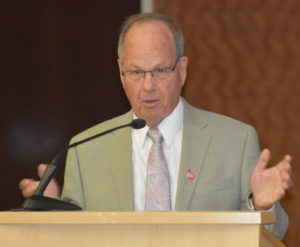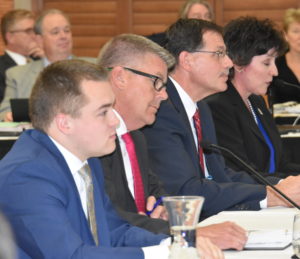MADISON – The Board of Regents voted today to approve a biennial budget proposal presented by the University of Wisconsin System that targets affordability, talent development, and return on investment for the people of Wisconsin.
The UW System request calls for an investment of $107.5 million in state funds, including $82.5 million in outcomes-based funding to support university and statutorily required goals related to student success, workforce development, and operational efficiencies, and $25 million to address capacity-building initiatives, primarily for STEM and high-demand fields.
“I think it’s a very good budget,” said Regent Ryan Ring, a senior at UW-Eau Claire. “In coming years, students will feel the impact of it, and it will be very positive.”
- View the UW System news release.
- View the 2019-2021 biennial budget funding request.
- View the UW System Operating Budget Request PowerPoint.
- View the UW System Capital Budget Request PowerPoint.
As part of the biennial budget request, the Board of Regents also approved UW System’s 2019-21 capital budget recommendations, which largely focus on renovation, repair and replacement of aging or obsolete facilities. More than 60% of the UW System’s 62 million square-foot building inventory was constructed between 1950 and 1979, and much of that inventory has had little renovation or upgrade since its inception.
UW System’s capital request seeks project authority in 2019-21 and into 2021-23 for five projects. Within the 2019-21 portion of this request are six academic facilities and five utility/central plant projects that would be funded with $463.9 million in bonding to renovate, expand and replace obsolete facilities. Another 10 projects to be funded with $506.4 million are financed exclusively through UW program revenue, both borrowing and cash. These projects, funded entirely by UW System institutions, include a new residence hall and renovation of existing residential halls, recreational and athletic facilities, and a student union, to replace outdated facilities and accommodate growing student demand.
The request includes $446.5 million in bonding for the five advance enumeration projects, requested now for 2021-23, and focused on science, engineering and priority academic programs.
The UW System’s FY 2019-2021 biennial budget request must be submitted to the state’s Department of Administration in September for consideration as part of the Governor’s executive budget, which is typically released in February.
Value of Public Higher Education
Dr. David J. Ward, CEO of NorthStar Analytics, told Regents that the UW System has a $24 billion economic impact on Wisconsin annually, according to 2016-17 figures included in 2018 UW System Economic Impact Study.
The System generates or supports 167,000 jobs, produces $1.1 billion in local and state taxes, and $23 dollars in economic activity for every $1 dollar invested, the study shows. It also reveals that 75 percent of the economic impact directly affects the private sector and that the System produces $9.3 billion in labor income.
Regents also heard from Chancellors Debbie Ford of UW-Parkside and Dean Van Galen of UW-River Falls, as well as Regents Drew Petersen and Ryan Ring on the Guardian Initiative, a national effort to rebuild the public’s trust in higher education and to promote higher education’s value. That effort, led by the Association of Governing Boards, mirrors actions already underway in Wisconsin, and numerous Regents pledged to be active in the effort.
“Higher education transforms lives, and changes the trajectory of lives,” said Chancellor Van Galen. “It is worthy of support and our collective advocacy.”
“We know, both nationally and in the UW System, college graduates earn more over a lifetime, tend to be more engaged in their communities as volunteers and leaders, and use the learning experiences in their degree programs to adapt and to lead in this world of accelerating change,” said Chancellor Ford.
Regent Petersen issued a “clarion call to action” to fellow Regents to support the Guardians Initiative and to dispel public skepticism about the value of higher education.
“For us to fulfill our statutory responsibilities we need the business community, our elected officials, and the public to see the value in higher education and to see the investment the State makes in the UW System as worthwhile and wholly impactful,” he said.
He encouraged board members to meet with local officials and civic organizations, attend campus events, and generally increase their local visibility.
Regent Ryan Ring, a UW-Eau Claire senior, also encouraged Regents to meet with students and faculty. He noted even “demonstrating to the campus leadership that the Board is engaged and supportive is enough.”
Several Regents expressed support.
“This is timely and this is important,” said Regent Regina Millner. She also noted that Regents’ public advocacy for the System “humanizes what this institution is all about and it humanizes the governing board of this institution.”
Regent Bryan Steil said Regents can dispel misperceptions about college costs while also listening to Wisconsin residents who don’t have a role on a college campus.

Regent Emeritus Higgins (2nd from left) is recognizaed with a resolution of appreciation for his service. Also picture (from left): Regent Tyler, Regent President Behling, and UW System President Cross
Resolution of Appreciation
Regents recognized the service of Regent Emeritus Tim Higgins, whose seven-year team ended this past spring.
Higgins told Regents that he had wanted to serve on the board ever since he was an undergraduate at UW-Madison.
“We all want to leave a mark, like carving our initials on a mighty tree,” Higgins said.
Education Committee
Carleen Vande Zande, Associate Vice President for Academic Programs and Educational Innovation, provided the Education Committee with an annual update regarding the UW System academic program array. The presentation addressed the growth and elimination of academic degree programs, the expansion of collaborative and distance education programs, and comparisons with other systems of higher education in the United States.
In other business, the Education Committee:
- Approved two degree programs from UW-Green Bay: a Bachelor of Science in Nursing (BSN) and an Executive Master of Business Administration (MBA). The undergraduate nursing degree program will expand capacity of UW-Green Bay to fulfill unmet student demand for a high-quality BSN degree at a reasonable tuition cost;
- Approved a UW-Stevens Point proposal, in response to accreditation recommendations, to expand three existing degree programs from concentrations to fully articulated majors, within the UW-Stevens Point Bachelor of Science in Business Administration degree: Bachelor of Science in Finance, Bachelor of Science in Management, and Bachelor of Science in Marketing;
- Approved UW-Madison’s supplemental request for a special building fund in support of its Chemistry Building for submission to the Vilas Trustees. At the end of fiscal year 2018, the Vilas Trustees proffered unallocated income in the amount of $3.7 million and sought a supplemental request for this income from UW-Madison and the Board of Regents;
- Approved UW-Extension’s request to correct an error in the 2018 Report on Faculty Promotions, Tenure Designations, and Other Changes of Status;
- Held the first hearing for UW-River Falls’ revised mission statement and mission addendum. The updated version includes required language regarding the types of student populations, academic programs, and degrees conferred by UW-River Falls;
- Heard a presentation by a panel of four Deans from UW-Eau Claire, UW-La Crosse, UW-Madison, and UW-Milwaukee, entitled: “Building a Strong Teacher Workforce for Wisconsin;”
- Heard an update from Karen Schmitt, Interim Vice President for Academic and Student Affairs, regarding both the UW Colleges and UW-Extension Restructuring Initiative and the UW System Math Initiative.
Capital Planning and Budget Committee
The Capital Planning and Budget Committee approved name changes for former UW Colleges campuses who will be transitioning to branch campuses of regional comprehensive campuses. The committee approved the following name change requests:
- UW-Green Bay:
- University of Wisconsin-Green Bay, Marinette Campus
- University of Wisconsin-Green Bay, Manitowoc Campus
- University of Wisconsin-Green Bay, Sheboygan Campus
- UW-Milwaukee:
- University of Wisconsin-Milwaukee at Washington County
- University of Wisconsin-Milwaukee at Waukesha
- UW-Platteville:
- University of Wisconsin-Platteville Baraboo Sauk County
- University of Wisconsin-Platteville Richland
- UW-Stevens Point:
- University of Wisconsin-Stevens Point at Wausau
- University of Wisconsin-Stevens Point at Marshfield
- UW-Whitewater:
- University of Wisconsin-Whitewater at Rock County
In other business, the Committee:
- Approved UW-Green Bay’s request for authority to enter a lease with Brown County for office and laboratory space in the Brown County STEM Innovation Center, a building that will be constructed on the UW-Green Bay campus. That facility will house various tenants such as the Einstein Project, a private non-profit organization dedicated to the development and distribution of STEM education materials, UW-Extension Agriculture and Horticulture programs, Brown County Land and Water Conservation offices, and UW-Green Bay’s mechanical engineering program;
- Approved a request from UW System on behalf of UW-Madison for authority to increase the budget of the gift-funded UW-Madison Hoofers Boat Dock and Deck Replacement project;
- Heard from Associate Vice President Alex Roe on recent State Building Commission approvals.
Research, Economic Development and Innovation Committee
UW-Madison Business Professor Jon Eckhardt, Institute of Entrepreneurship and Economic Development Executive Director Mark Lange, and WEDC Vice President for Entrepreneurship and Innovation Aaron Hagar discussed the growth of entrepreneurship in Wisconsin. Using “big data” is a key component in this work
Eckhardt is harnessing data to identify, analyze and quantify the predictive characteristics of successful student innovators and business startups. A survey of UW-Madison students over three years found that more than 460 students had founded companies – something Eckhardt believes no other university knows about its students. Nearly 700 were in the process of forming a company, nearly 1,500 were working at a start-up and nearly 5,200 had taken a course in entrepreneurship.
Lange is putting data to work for improved tracking of entrepreneurship activity in Wisconsin. Hager is using data to understand the art of building capacity to support a thriving entrepreneurial ecosystem.
In other business, the REDI Committee:
- Heard an update from the Wisconsin Economic and Development Corporation on International Trade and Foreign Direct Investment – Connecting University Researchers and Innovators with Global Business Opportunities. Katy Sinnott, WEDC Vice President of International Business Development, provided an update on a growing list of initiatives and programs, with a focus on WEDC’s efforts to collaborate with the university and state businesses to foster exports for Wisconsin business and to increase awareness of foreign direct investment opportunities within the state.
- The committee also received an update from Dr. Ryan Owens, director of the UW-Madison Tommy G. Thompson Center on Public Leadership, on the Thompson Center’s activities to date, as well as future activities, faculty awards, and speaker awards.
Business and Finance Committee
The Business and Finance Committee heard from UW System Chief Information Officer Steven Hopper on the status of 12 large IT projects underway in the UW System. Most projects were deemed to be on target with respect to schedule, scope and budget, with four relatively minor concerns noted.
In other business, the Business and Finance Committee:
- Heard from Rob Cramer, Vice President for Administration, and Steve Wildeck, Executive Director of UW-Shared Services, on how a new UW-Shared Services model is being developed under the auspices of UW System’s CORE Initiative. The goal is to further standardize, consolidate, and streamline administrative operations to reduce costs and improve results through greater efficiency and effectiveness;
- Approved an additional one-year extension to an existing agreement with Fox World Travel for travel management and corporate self-booking services;
- Approved a four-year Sponsored Research Agreement between UW-Milwaukee and Eaton Corporation. The agreement involves work to develop a prototype distributed sensor network and analytics platform under a pass-through agreement through Eaton Corporation;
- Approved a contract between UW-Madison and Learfield for a potential seven-year term. The agreement would engage Learfield to assist with the identification and leveraging of corporate marketing partnerships for various non-athletic areas of the campus;
- Approved a five-year Master Sponsored Research Agreement between UW-Madison and Deere and Company. The agreement will involve research on potential efficiency gains from the electrification of off-road powertrains;
- Approved a salary range exceeding 75% of the UW System President’s salary for the Dean of the School of Business at UW-Madison. This would allow UW-Madison to recruit for a new Dean of the School of Business at a salary of up to $500,000;
- Heard from Trish Reopelle and Mike Jacobs, representatives from the State of Wisconsin Investment Board (SWIB), on highlights of the Quarterly Investment Report. This was the first quarterly investment review since SWIB took over management of these assets. Trust Fund assets at the end of the period totaled $577 million, with a total of $420 million in the Long-Term (endowment) Fund and $157 million in the shorter-term Income Cash Fund. For the quarter that ended June 30, 2018, the Long-Term Fund gained 0.60%, while the Income Cash Fund gained 0.45%.
- Reviewed a summary of gift, grant, and contract awards for the period July 1, 2017, through June 30, 2018. Awards for the period were approximately $1.529 billion, an increase of $90.0 million compared to the prior year. Federal awards increased $38.7 million while non-federal awards increased by $51.3 million.
- Heard Rob Cramer on the shift of Workers Compensation activities from UW-Madison to UWSA, as well as address some changes to UW vehicle insurance.
Audit Committee
Chief Audit Executive Lori Stortz and audit directors provide a high-level overview of the progress management has made toward resolving comments and implementing recommendations included in audit reports.
In other business, the Audit Committee:
- Heard a report from Lori Stortz on the Fiscal 2019 Audit Plan Progress to date and were provided a brief report concerning internal audit activities.
- Vice President for Administration Robert Cramer and Assistant Vice President of Administration Ruth Anderson provided background on enterprise risk management and discussed the creation of a systemwide risk committee.
- Associate Vice President for Information Security Katherine Mayer provided a brief update on the Information Security Policy for Employees whose Affiliation Has Changed (emeriti, sponsored retirees, etc.) policy status.
- Vice President for Finance Sean Nelson provided a summary of UW System’s management response to the Recommendations in the Legislative Audit Bureau’s Audit Report 18-4.
- UW System General Counsel Quinn Williams briefly discussed an Employee Ethics and Public Records Management handout which was recently prepared and disseminated.
The UW System Board of Regents will resume its meeting on Friday, Aug. 24, 2018, in Madison.


